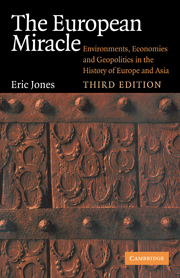Book contents
- Frontmatter
- Contents
- Preface to the third edition
- Preface and acknowledgements
- Introduction to the second edition
- Map
- EURASIA
- EUROPE
- THE WORLD
- ASIA
- 9 Islam and the Ottoman Empire
- 10 India and the Mughal Empire
- 11 China and the Ming and Manchu Empires
- EURASIA
- Afterword to the third edition
- Annotated bibliographical guide to Eurasian economic history in the very long term
- Bibliography
- Supplementary bibliographical guide
- Index
11 - China and the Ming and Manchu Empires
Published online by Cambridge University Press: 05 June 2012
- Frontmatter
- Contents
- Preface to the third edition
- Preface and acknowledgements
- Introduction to the second edition
- Map
- EURASIA
- EUROPE
- THE WORLD
- ASIA
- 9 Islam and the Ottoman Empire
- 10 India and the Mughal Empire
- 11 China and the Ming and Manchu Empires
- EURASIA
- Afterword to the third edition
- Annotated bibliographical guide to Eurasian economic history in the very long term
- Bibliography
- Supplementary bibliographical guide
- Index
Summary
We have only to compare western society with China's bureaucratic society to appreciate fully the ‘miracle’ that occurred in Europe during the sixteenth and seventeenth centuries. The concatenation of circumstances that brought capitalism to birth there and thus set in motion the industrialization of the entire world has all the appearance – when seen in this light – of being a freak of fortune, one of history's privileged occasions, in this case granted solely to that tiny promontory of Asia, Europe
Etienne Balazschina's uniqueness lay in retaining an empire and a culture for an immense span of time. The remarkable longevity of the system was symbolised by the presence in Taiwan at least as late as 1970 of the representative of the seventy-seventh generation of the K'ung family, holder of a ducal title conferred on an ancestor by the Sung dynasty emperor Jen Tsung in the fifth century B.C. This is said, credibly enough, to be an unbeatable record for genuine aristocracy anywhere in the world (Stover 1974:229).
Yet an emphasis on the unchanging aspects of the system may unduly stress its monolithic elements. By the fourteenth century A.D. China had indeed achieved such a burst of technological and economic progress as to render suspect the frequently expressed belief that industrialisation was an improbable historical process (cf. Graham 1973; Cipolla 1967:101–2). The developments included a water-powered hemp-spinning machine as advanced as anything in Europe until about 1700.
- Type
- Chapter
- Information
- The European MiracleEnvironments, Economies and Geopolitics in the History of Europe and Asia, pp. 202 - 222Publisher: Cambridge University PressPrint publication year: 2003



